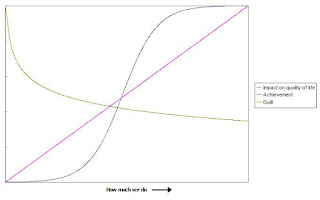These can be unified into a moral theory whereby the first priority is the perpetuation of intelligent life, the second priority is ensuring the physiological needs (bottom of the pyramid) of the existing community of intelligent life (greatest number), the third priority is ensuring the safety needs (next level of the pyramid) of the existing community of intelligent life, etc.
The obvious interpretation of this theory is that it is a moral traversty that the rich worry about their self-actualisation needs, whilst the poor worry about there physiological needs. But then we knew that anyway...




